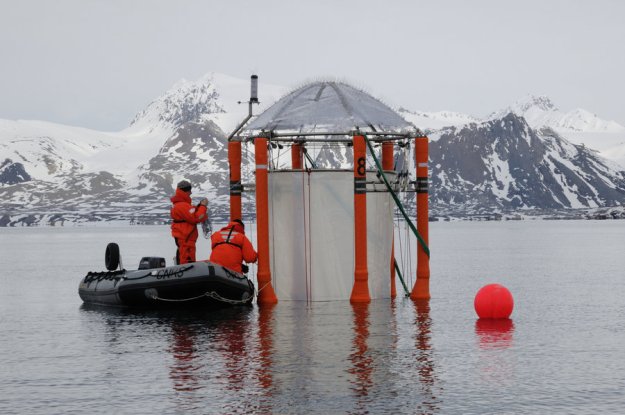Jan 19 2013
From January to June 2013, more than 60 European scientists will conduct a worldwide unique long-term experiment on ocean acidification at the west coast of Sweden. To study how natural marine communities develop in response to acidifying waters, the scientists will deploy a large-scale mesocosm facility in the Gullmar Fjord. The field experiment, which takes place in the framework of the German project on ocean acidification BIOACID (Biological Impacts of Ocean ACIDification), is coordinated by GEOMAR Helmholtz Centre for Ocean Research Kiel.
 Ten mesocosms are moored in the Gullmarfjord, Westsweden, for the long-term experiment on ocean acidification. Photos: Maike Nicolai, GEOMAR
Ten mesocosms are moored in the Gullmarfjord, Westsweden, for the long-term experiment on ocean acidification. Photos: Maike Nicolai, GEOMAR
In the past decade, research has revealed a wide range of organism responses to ocean acidification – the decline of seawater pH due to an uptake of man-made carbon dioxide (CO2) by the ocean. Laboratory and field experiments have focused primarily on individual species. Their responses to ocean acidification have mostly been studied in short-term experiments. But how do complex biological communities react to ocean acidification? Are they able to adapt to new conditions when exposed over long periods? To address these questions, long-lasting experiments on natural communities are urgently needed. “With the modified seagoing experimental platform, KOSMOS, we are now able to conduct the first long-term mesocosm experiment in the natural environment”, Ulf Riebesell points out. Riebesell is professor for biological oceanography at GEOMAR Helmholtz Centre for Ocean Research Kiel. He coordinates the BIOACID project and the upcoming mesocosm experiments.
Ten mesocosm units, each enclosing a volume of 55 000 litres of seawater, will be deployed by GEOMAR-scientists from the research vessel ALKOR in the Swedish Gullmar Fjord. Over a period of five months, an international team of scientists will monitor the responses of the plankton community to ocean acidification. During this time, the tiny plankton organisms form many new generations and go through a variety of species assemblages”, Riebesell explains. "Because of the short generation times of planktonic organisms and the rapid succession of different populations, it becomes possible to study adaptation processes in the natural environment.” With this new approach, Riebesell and his colleagues hope to make better predictions about the long-term consequences of ocean acidification.
Another focus of this study lies in the effects of ocean acidification on the development of fish. If the community at the base of the food web changes, this can have consequences for the entire trophic cascade up to the fish. To address this question, researchers release herring and cod larvae in the mesocosms and investigate their development in relation to the degree of acidification. A recent study on cod larvae demonstrated that their development can also be affected directly by ocean acidification.
The scientists from Germany, Sweden, Finland, Great Britain and the Netherlands chose the Sven Lovén Centre for Marine Sciences in Kristineberg as base of operations. From here they will go out by small boats to monitor the mesocosms daily and collect samples for laboratory analyses at the station. “Different teams investigate the development and productivity of the plankton community, changes in the food web, in the material and energy cycles and in the production of climate-active gases”, Riebesell describes the wide range of scientific questions addressed in this mesocosm campaign. “In total, 62 molecular, evolutionary, marine and fishery biologists, physiologists, ecologist, biogeochemists, marine and atmospheric chemists join this year’s KOSMOS experiment. With our multidisciplinary approach and the exceptionally long duration of the experiment, we expect many fundamentally new insights.”